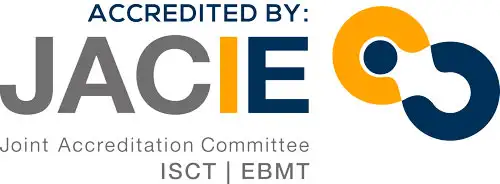Transplantation of hematopoietic progenitors
"With an experience of more than 25 years, we have a team of professionals with high specialization in the realization of this treatment".
DR. JOSÉ RIFÓN SPECIALIST. HEMATOLOGY AND HEMOTHERAPY DEPARTMENT

Hematopoietic progenitor transplantation is a therapeutic procedure used in neoplastic diseases (malignant tumors) or diseases with an alteration of the function of the bone marrow (organ in charge of producing blood cells).
This therapy can also be used in the treatment of various diseases of the immune system as well as some congenital metabolic disorders.
Traditionally, it has been called bone marrow transplant, because hemopoietic progenitor cells were always obtained from the bone marrow, but nowadays they are extracted, in most cases, from the blood and, sometimes, from the umbilical cord and the placenta.
These cells are normally found inside the bone marrow (especially the hip bones, vertebrae and ribs), but sometimes their number increases in the circulating blood, so they can be obtained through the veins as well.
The purpose of hematopoietic progenitor transplantation is to restore the function of the bone marrow (hematopoietic tissue) and have it produce blood cells normally.
At the Clinic we evaluate the possibility of bone marrow transplantation also in patients over 70 years of age.

A PERSONALIZED MEDICINE
Second Opinion,
peace of mind
Request a second opinion from our professionals with great experience in the diagnosis and treatment of oncological diseases
In 3 days, without leaving home.
Why choose the Clínica Universidad de Navarra
The Clinic is a pioneer in hematological cancer research and has the best medical technology to offer you the most appropriate treatment.
JACIE Accreditation
Accredited according to FACT-JACIE international standards for the performance of hematopoietic progenitor transplantation (HPT) in adults; and the collection, processing and administration of hematopoietic cell therapy products and immunoeffector cells.
Teamwork
Our team of professionals will be in direct contact with specialists at your reference center.
Experience
Between 20 and 30 marrow transplants per year, using both patient cells (autologous) and donor cells (allogeneic)
Speed, access and precision
Response within 24 hours concerning the suitability of treatment for each patient
Would you like further information about transplants?
It is necessary to replace the function of the bone marrow, when it is defective because it is sick: multiple myeloma, leukemia, medullary aplasia, immunodeficiency, certain types of lymphomas...
Or to palliate the damage suffered by the marrow due to the administration of a highly toxic treatment for a tumour or immune disease.
Most frequent indications for this treatment:
- Multiple Myeloma
- Leukemia
- Certain lymphomas
- Myelodysplastic syndromes and some childhood tumors (neuroblastoma, germ cell tumors)
- Other serious blood diseases such as: thalassemias, aplastic anemia and sickle cell anemia
- Some diseases of the immune system
Do you have any of these diseases?
You may need a bone marrow transplant
What does the process involve?
Pretransplant appointment
First clinical evaluation of the patient during an appointment with our team of specialists.
Evaluation
To assess whether the patient is a candidate, a complete blood test, echocardiography, pulmonary function tests and chest X-ray are performed.
Protocol assignment
If the patient is suitable, they are assigned to one of two protocols: transplant of their own stem cells (autologous) or donor transplant (allogeneic).
Autologous transplant
Before the transplant, treatment with growth factors and/or chemotherapy is performed to mobilize the stem cells extracted in the Apheresis Unit and processed in the Cell Therapy Area Laboratory.
Donor transplant
The donor will be tested to ensure there are no contraindications. Cells are extracted in the Apheresis Unit or in an operating room if extracted from bone marrow and processed in the Cell Therapy Laboratory.
Hospitalization
Patients will be admitted to the Clínica’s Transplant Unit for two to four weeks.
Conditioning
Patients receive chemotherapy and/or radiotherapy as preparation to receive the transplant.
Cell infusion
A progenitor cell infusion is performed, which takes between 30 minutes and an hour.
Posttransplant follow-up
Follow-up is conducted in the transplant clinic for three months following autologous transplants and for between six months and two years for allogeneic transplants.
Learn more about bone marrow transplantation
The treatment is provided through a multidisciplinary structure involving Hematology, Oncology, Pediatrics, the Blood Bank and Immunology.
Extraction of the cell product used for the transplant is carried out on an outpatient basis at the Therapeutic Apheresis Unit, located at the Day Hospital. The unit features state-of-the-art cellular processors in individual rooms.
Doctors specializing in Hematology and Hemotherapy, as well as twelve nurses with expertise in therapeutic apheresis, perform these processes while ensuring optimal safety and maximum efficiency.
The cellular products for transplantation are processed in the GMP Cell Therapy Laboratory under a strict quality-assurance system. This facility has clean rooms and ultrafiltrated sterile air with the most stringent guarantees possible in terms of preparing each patient’s products.
The Hematopoietic Transplant Clinical Unit, where the transplant is carried out and patients are admitted, consists of five individual rooms with treatment and air ultrafiltration, which guarantee optimal conditions for immunosuppressed patients. Clinical care is provided by an expert hematopoietic transplantation team.
Allogeneic transplant
Hematopoietic stem cell transplantation can be performed from a healthy donor, usually a matched sibling. If this option is not available, cells obtained from another compatible family member may be used.
An unrelated person can also be a donor. In this instance, this person must be found among the voluntary donors registered in different countries.
Umbilical cord
Transplants are sometimes carried out using cells obtained from umbilical cord blood.
These donor transplants are called allogeneic transplants and are most often used when the disease to be treated primarily affects the bone marrow.
Autologous transplantation
Hematopoietic stem cell transplantation can also be performed using the patient’s cells. These are usually performed for neoplastic diseases when the bone marrow is not affected or when the disease has been eliminated from the bone marrow.
Hematopoietic stem cells can be obtained directly from the bone marrow in an operating room or, more frequently, from peripheral blood using a machine (apheresis machine) that, when connected to a vein, circulates the blood through a circuit and centrifuges the blood to separate out blood cells and select the cells to be collected; the remaining blood is returned to the patient.
Before performing the transplant, a conditioning treatment must be administered, which generally consists of high doses of chemotherapy that are sometimes combined with radiotherapy. This eradicates the disease to be treated and, in cases of allogeneic transplantation, also suppresses the patient’s immune system so the donor cells are not rejected.
The hematopoietic stem cells are then administered as a blood transfusion.
Due to prior treatment, patients enter an aplasia phase, characterized by a decrease in blood cells (leukocytes, red blood cells and platelets), which can lead to infections, bleeding and other complications. This means patients must remain in the hospital under special conditions until the infused stem cells regenerate and produce enough cells to replace those destroyed by the treatment. This period depends on the type of transplant and the conditioning treatment, but it usually lasts between two and four weeks.
Other potential complications come from the rejection between patient and donor immune systems (defensive cells). The greater the incompatibility between their cells, the greater the rejection.
Patients then remain in hospital for a period of time that varies depending on the transplant type, until the immune system fully recovers.
Before performing a hematopoietic stem cell transplantation, a conditioning treatment must be administered.
This usually involves high doses of chemotherapy, sometimes combined with radiotherapy, required to eradicate the disease being treated; for allogeneic transplantation (from a donor other than the patient), it is also intended to suppress the patient’s immune system so that it does not reject the donor cells.
The hematopoietic stem cells are then administered just like in a blood transfusion.
The Clínica’s Hematopoietic Transplant Unit currently features open clinical trials for pretransplant conditioning with radioimmunotherapy (both for autologous and allogeneic transplants) and to treat graft-versus-host disease using mesenchymal stem cells from the bone marrow produced in the GMP Laboratory.
Patients who have undergone hematopoietic transplantation must remain in the hospital under special conditions until the infused stem cells regenerate and produce enough cells to replace those destroyed by the treatment. This period depends on the type of transplant and the conditioning treatment, but it usually lasts between two and four weeks.
Other potential complications come from the rejection between patient and donor immune systems (defensive cells). The greater the incompatibility between their cells, the greater the rejection.
Patients remain in the hospital for a period of time that varies depending on the transplant type, until the immune system fully recovers.
What clinical trials do we have on hematopoietic progenitor transplantation?
The Hematology and Hemotherapy Service of the
at the Clínica Universidad de Navarra
The Hematology Service of the Clinic, formed by specialists of recognized national and international prestige, has integrated molecular diagnostic techniques and the use of new personalized treatments in its assistance work, allowing a more precise and fast diagnosis of the hematological diseases.
The joint work of the medical staff and the researcher facilitates the development and application of the new treatments and at the same time the precise evaluation of the result of the treatments.

Why at the Clinica?
- Experts in the development of Cellular Therapy treatments.
- International reference center in lymphomas, multiple myeloma and monoclonal gammopathies.
- Experts in the diagnosis and treatment of hemorrhagic and thrombotic problems.
Our team of professionals





























